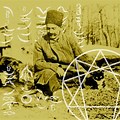 v
v







Anointing
Then the Lord said to Moses.
"Take the following fine spices: 500 shekels of liquid myrrh, half as much (that is 250 shekels) of fragrant cinnamon, 250 shekels of fragrant cane, 500 shekels of cassia - all according to the sanctuary shekel - and a hint of olive oil. Make these into a scared anointing oil, a fragrant blend, the work of a perfumer. it will be the sacred anointing oil.'
The Holy Bible New International Version Exodus 30:20-25
By anointing with the oil, the sick are strengthened and healed, the catechumens are empowered to resist Satan and to reject sin and evil, the batized are sealed with the
gifts of Spirit, and the ministers of the Church are sanctified in God's service.
Through the use of these holy oils may God's grace be poured forth always upon the Church.
Rite for blessing the repository in which anointing oils are kept (Catholic Church) Book of Blessings 1985
Anointing was practised by the ancient Mesopotamians, Egyptians, Syrians and Persians, as well as by the Hebrews. In Egypt, according to Eugene Rimmel, author of the book of Perfumes, 'Besides incense, ointment was also offered to the gods, and formed an indispensable part of what was considered a complete oblation. It was placed before the deity in vases of alabaster or other costly material, on which was frequently engraved the name of the god to whom it was offered.
Sometimes the king or the priest took out a certain portion, and anointed the statue of the divinity with his little finger... No king could be crowned without being anointed: this was done privately by the priests, who pretended that the ceremony had been performed by a god, in order to convey to the people a more exalted notion of the benefits conferred on their monarchs.' Even mummies were anointed, several times a year, with 'sweetly scented oil' which 'was poured over their heads and carefully wiped off with a towel carried on the shoulder for the purpose. A priest was generally called in to officiate on these occasions.'
Mary Magdalene is sometimes called 'the patroness of aromatherapy' because she famously anointed Jesus with a great deal of spikenard in St John 12:3-7 and St Mark 14:3-8. Jesus sent his disciples out 'by two and two', to spread the word, and in Mark 6:13, 'they cast out many devils, and anointed with oil many that were sick, and healed them.'
According to Martin Dudley and Geoffrey Rowell, authors of The Oil of Gladness, anointing in Christian Tradition, during the early Church years'...there was a good deal of "do-it-yourself" anointing during this period.
Phials of oil are passed from a holy man to distressed a woman, from monk-bishop to the terminally sick. 'Ideally the anointing oil should have been blessed by a bishop, a presbyter, or even a holy man of the desert, but if absolutely stuck', the oil from a lamp in the church would have to do.
Around Ad 405, Pope innocent ll told a bishop that oil consecrated by him 'is lawful not for the priests only but for all Christians to use for anointing in their own need or in the need of members of their household'.
The significance of the act of anointing in the Christian tradition is perhaps best made clear by the words used during the holy rites. The following are the words used during the rites of various traditions; where there is a '+' symbol, that indicates a cross is made with the fingers at that point. The first two extracts are form the consecration of the Holy chrism rite, and are very similar although they're from two churches - the contemporary Anglican and the Reformed Roman.
And so, Father, by the power of your love, bless to our use this mixture of oil and perfumes as a sign and means of your heavenly grace. Pour out the gifts of your Holy Spirit on those who are anointed with it. Let the splendour of your holiness shine on the world from every place and thing signed with this oil.
Contemporary Anglican rite-Consecration of the Holy chrism
And so, Father by the power of your love, make this mixture of oil and perfume a sign and source + of your blessing. Pour out the gifts of your Holy Spirit on our brothers and sisters who will be anointed with it. Let the splendour of holiness shine on the world from every place and thing signed with this oil.
Reformed Roman rite - Consecration of the Holy chrism
Oh, Lord the Creator of all things, by your servant Moses you commanded the hallowing of ointment made with the mixture of aromatic herbs: We humbly implore your mercy that you would bestow the grace of your Spirit and the fullness of + consecration on this ointment, drawn from a growing plant..
May this mingling of liquids bring to all anointed with them the mercy and safe protection for ever and ever Amen.
Pre-Vatican 11 Roman rite - Consecration of the Holy Chrism
Lord God you bring healing to the sick through your son, Jesus Christ, our Lord. may your blessings come upon all who are anointed with this oil, that they may be freed from pain and illness and be made whole. Amen.
Lutheran Church in America and Canada. Prayer for the laying on of hands, and anointing the sick, using olive oil blended with aromatic ingredients
...and we pray that we may receive your hallowing , like the chrism which is poured upon our heads, since the chrism which is poured out in the Name of your only begotten Son, Christ our God, through whom the whole world, visible and invisible, is sweetly scented.
The Byzantine Rite, Blessing of the Holy chrism
The byzantine chrism is made by combining olive oil with between thirty -eight and fifty seven- aromatic substances, making it one of the most complex synergistic blends ever devised. different Christian traditions apply holy chrism in different circumstances, which may include some, or all of the following: Baptism, confirmation, anointing the deceased, ordination of bishops, altars, chalices and bells.
In the Roman Catholic Church, the only requirement is that' some aromatic substances' is added, so there is a fair amount of variation in the constituents.
In a private communication, Revd Allen Morris has said that, 'it would be proper only for natural fragrances to be used.'
In the Christian tradition, in years gone by, the use off fragrance by women for cosmetic purposes was sometimes frowned upon because it seemed to indicate a certain frivolity, or because it diverted aromatic resources, from their more important, spiritual, use.
These days, fragrant materials are much more widely available - especially in synthetic form, but we have forgotten that fragrance is inextricably linked with spiritual practice. Yet, what does a woman do when she dabs perfume on her wrist but anoint herself? It seems a profoundly secular act, the height of indulgence, yet it finds echoes in our spiritual past, when people made themselves fragrant to make themselves more acceptable to God.
Although fragrance has got itself a bit of a bad name because of ' the fallen woman' syndrome, it was originally used to attract God and the angels, rather than any potential suitor. If we can get past any self-indulgent or even lascivious connotations, and understand the spiritual nature of fragrance, then 'anointing ' in this sense can assume again some of its original purpose and meaning.
In the traditional use of the word 'anointing', oil is always taken as the basic substance used. But if fragrance is the key substance of interest, it can be carried in a water-alcohol solution as well as by the oil. We can make our own spiritual blends of essential oils, and use them within an oil-based 'perfume' or within a water-based spray, like an eau de Cologne.
The aroma in these circumstances is intended to attract the messengers of heaven, and help us become closer to the universal whole as we carry out our spiritual practice, such as prayer, meditation or affirmations.
Thou lovest righteousness, and hatest wickedness: therefore God, thy God, hath anointed thee with the oil of gladness above thy fellows.
All thy garments smell of myrrh, and cloves and cassia, out of the ivory palaces, whereby they have made thee glad. Psalm 45:7-8
Reference: The Fragrant Heavens:V.A.Worwood
Articles-Latest
- Koran burning conviction sparks fury as blasphemy law 'returns to UK'
- Robert Francis Prevost - Pope Leo XIV
- Pope Francis' death follows recent health challenges. Here's what we know about how he died.
- Easter April 2025 - international Celebrations
- The Rule of the twelve psalms -Worthy is the Lamb
- Religion in Africa Before Christianity and Islam
- 6 The Origin of Yahweh
- Dumo Di Milano
- What Did the Crow Tribe Believe In: Discover The Beliefs!
- 7 Reasons Historic Christianity Rejects the Book of Enoch
- 8 Breathtaking Mountain Monasteries Around the World
- Ethiopian Bible is oldest and most complete on earth
- Muhammad Muhammad was a prophet and founder of Islam.
- World Day of the Poor – SVP Christmas Campaign 2024
- Pope Francis to open 5 sacred portals on Christmas Eve — for a ritual that’s never been done before
- The 144,000 in Revelation
- Over 73 dead bodies 'used for meditation', 600 crocs in a pond, found in two Thai temples
- Occultism: Western Occult Tradition
- What is a Mudra
- Blood Sacrifices: Ancient Rituals of Life and Death
Articles-Most Read
- Home
- Let There Be Light
- Plants that feel and Speak
- The Singing Forest
- The Singing Forest-2
- Introduction
- Meditation
- Using Essential Oils for Spiritual Connection
- Heaven Scent
- Plants that Feel and Speak-2
- Purification
- Making the Spiritual Connection
- Anointing
- Essential Oils: The unseen Energies
- The Sanctity of Plants
- The Aroma Of Worship-Foreward
- The Aroma Of Worship - Introduction
- Methods Of Use
- Spiritual Blending
- Handling and Storage






